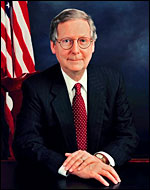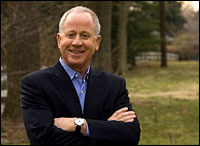
In January, Senate Minority Leader Mitch McConnell (R-Ky.) released an ad for his reelection campaign in which he proclaimed himself the “Godfather of Green” and an “environmental champion.”
Anyone who’s followed McConnell’s 24-year career in the Senate probably mistook the ad as satire. McConnell has earned an underwhelming lifetime voting score of 7 percent from the League of Conservation Voters, which this year named him to its “Dirty Dozen” list and asserted that his record on environmental issues is “among the worst in Washington.” “[T]his ‘Godfather of Green’ is the new ‘Don’ of the Dirty Dozen,” said LCV President Gene Karpinski.
As minority leader, McConnell has led Republican opposition to a number of environmental measures in the past two years. Under his leadership, Senate Republicans stalled passage of renewable-energy tax credits for most of 2008. McConnell led efforts to tie up the Climate Security Act in procedural stalls, which led to the early death of the bill. He’s been a leading champion of offshore drilling, claiming in July that people in Alabama, Louisiana, Mississippi, and Texas think “oil rigs are pretty.”

McConnell has also been a top recipient of campaign contributions from special interests in the energy, natural resource, mining, and agricultural sectors.
Enviros would love to see McConnell ousted this year, and yet they’re not swooning over his Democratic challenger, Bruce Lunsford, a lawyer and businessman who served on Kentucky’s Commerce Cabinet in the early ’80s. Lunsford hasn’t won any endorsements from green groups.
Lunsford’s “8 Point Plan for Energy Independence” is a mixed bag, with some aspects enviros applaud and others they don’t:
- Release some oil from the Strategic Petroleum Reserve
- Crack down on energy market speculation
- Institute a gas-tax holiday
- Curb price-gouging
- Require oil companies to drill on public land they already have under lease
- Develop oil-shale resources
- Promote “clean coal” and coal-to-liquid technologies
- Move toward “alternative and renewable energies” by investing R&D, providing tax incentives for energy efficiency and hybrid vehicles, and improving public transportation
He also lists “alternative energy technologies” as part of his plan to create new jobs.
Lunsford has been running ads in Kentucky targeting McConnell for supporting tax breaks for Big Oil. His campaign has been touting a video of Lunsford pumping gas and talking to citizens around the state about prices.
McConnell has also been running an ad on gas prices in the state, attacking Lunsford for not supporting offshore drilling and saying that “McConnell is leading the fight for more exploration.” The ad makes reference to McConnell opposing “new energy taxes that consumers would be forced to pay at the pump.” McConnell is airing another ad alleging that Lunsford is responsible for a recent increase in the state gas tax — in fact, the McConnell campaign has created an entire website on the subject.
There doesn’t appear to be an energy plan on McConnell’s website, but visitors can sign a petition in support of the “Gas Price Reduction Act of 2008,” a drill-happy bill that McConnell introduced in the Senate in June but was unable to move forward.
In July, McConnell was blowing Lunsford out in the polls by a 12-point margin. Recent polls show the gap has narrowed to about 7 points, but the odds are still in McConnell’s favor.


